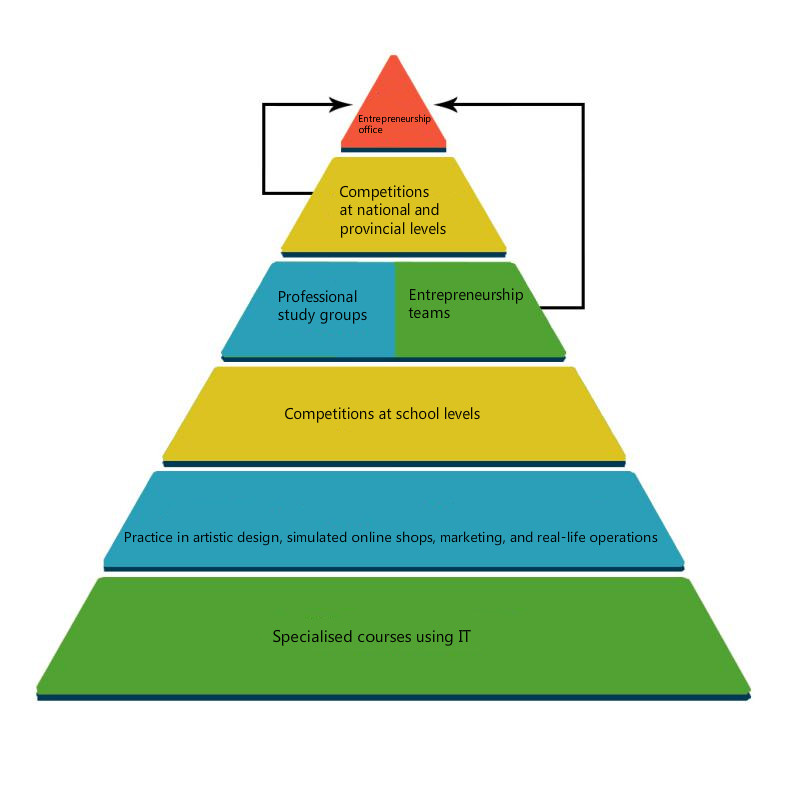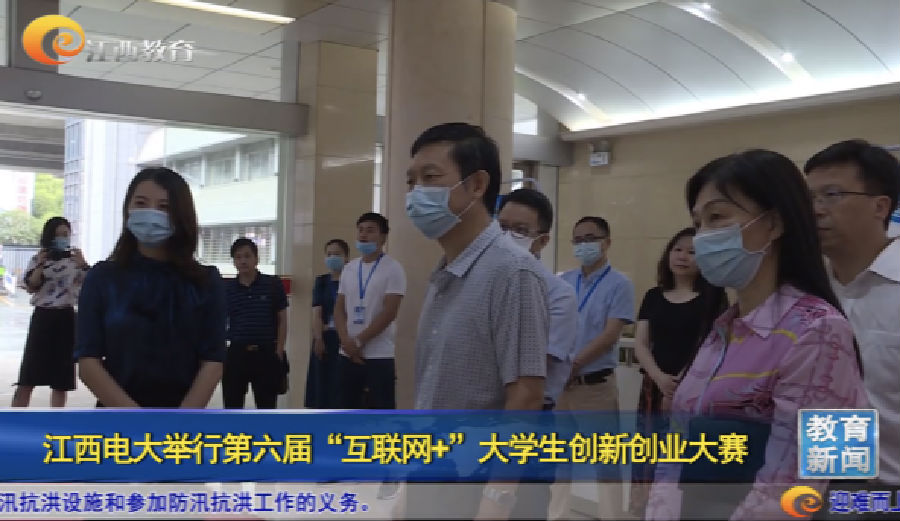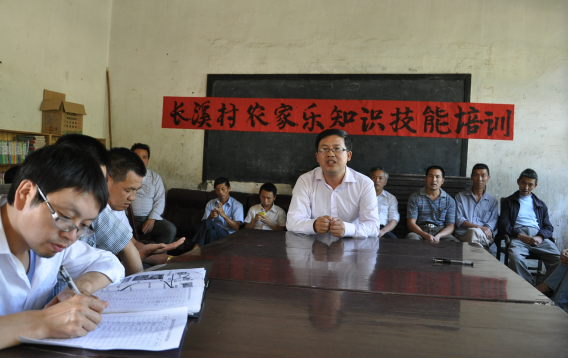 Chen Yawei is a full-time teacher in the Faculty of Economics and Management of Jiangxi Open University (Jiangxi OU).
Chen Yawei is a full-time teacher in the Faculty of Economics and Management of Jiangxi Open University (Jiangxi OU).
In her seven-plus years of teaching, she has been diligent and conscientious, dedicated to her students, friendly with her co-workers, and highly praised by all who have come into professional contact with her. She has also received numerous awards.
1. Taking advantage of information technology
Chen Yawei firmly believes that teachers are the foundation of a university, and that their ethics are the essence of education. She has gained extensive experience in teaching and management since joining Jiangxi OU in 2013, having managed the courses Management Methods and Art, Science and Art of Leadership, Tea Marketing, and Teahouse Operations and Management. Currently, she is director of the adult-education E-commerce major, and head of the teaching and research section of the E-commerce College of Higher Vocational Education at Jiangxi OU.
Chen Yawei devotes herself wholeheartedly to teaching, ensuring that she has a sound grasp of her discipline while keeping abreast of new developments in it. She also reflects on her own teaching and its methods, and never strays from being conscientious and striving for the highest quality.
She also makes use of information technology to ensure that her remote teaching has the same effect as face-to-face, and produces numerous useful online resources via the learning network of the Open University of China (OUC) and the lifelong-learning network of Jiangxi Province. She live-streams classes, and also uses chat apps to teach, arranging for one-on-one contact with students. Her guiding principle is that teaching and learning reinforce each other, so that the enthusiasm of her students in turn enhances her teaching.
At the same time, she is skilled at integrating ideological and political instruction into her teaching via small activities, homework, and interactive discussions, guiding students to assess events correctly and integrate their love of family and country into their studies.
In 2020, the sudden outbreak of Covid-19 forced Chen Yawei to modify her teaching in terms of activities and of integrating ideological and political education. She produced a set of high-quality online multimedia resources via a variety of platforms, adopting a combination of self-directed study, live lectures to address difficult key points, live discussion, and after-class guidance. The results of the final examination showed that her instruction was almost as effective as it had been before the pandemic.
2. A "six-tier pyramid" talent-training system helps create excellence

Chen Yawei has found that every individual student has great potential, and in order to help realise it she established a "six-tier pyramid" talent-training system that aims to get the best out of students of all levels of ability.
For first-year students, she uses both face-to-face and online teaching to give them a solid foundation of knowledge and skills. In their second academic year, the more advanced and motivated students are selected to enter university competitions or join entrepreneurship groups, after which some of these are selected for a further round of advanced training. In their third academic year, on the basis of the training they have received so far, the most outstanding students will participate in national and provincial skills and entrepreneurship competitions, as well as entrepreneurship-incubation teams involved in real projects. The ultimate aim is to bring together and train talent of the highest quality.

Over six years of implementing this approach, Chen Yawei has led her student teams to a variety of national and provincial vocational-skills and entrepreneurship competitions, with 1 national special prize, 2 provincial special prizes, and 2 national first prizes resulting. Her students have also taken part in 3 campus-based entrepreneurship-incubation projects, and most of them have obtained high-quality employment or made entrepreneurial achievements. Her approach also came 2nd in the Jiangxi Provincial Teaching-achievements Competition in 2019.
3. Repay Society through Education
In 2015, Chen Yawei led an e-commerce-entrepreneurship team to work with Dai Xiangyang, secretary of the Party Branch in Changxi Village, Wuyuan County, and a student in the "One College Student per Village" programme, through the same programme at Jiangxi Radio and TV University (Jiangxi RTVU). In over 10 field visits and investigations, they determined that Changxi, a village with a history of one thousand years, had high-quality ecological resources but also a remote location with backward transportation, leading to an extremely underdeveloped economy. Her team decided to use its knowledge of e-commerce to help the village.


Over the years, relying on the rich training and teaching resources of the e-commerce industry, and by combining offline innovation and entrepreneurship with talent training and e-commerce projects and products, she has also worked hard on behalf of rural industries and specialty village products, helping promote e-commerce entrepreneurship in the area.
1) Entrepreneurs are trained through the "One College Student per Village" programme by applying emerging e-commerce technology to rural poverty alleviation, enabling rural development to expand.
In Changxi Village, Chen Yawei's team decided to base its development strategy on the village culture, establishing a rural-tourism cooperative to promote the unique characteristics and culture of the area via three major channels - online shopping, mobile media, and internet distribution – and helping sell agricultural products and cultural items while developing tourism. These efforts have helped enhance farmer incomes while also preserving rural cultural, and promoting rural revitalisation overall.
Its years of persistent efforts have enabled the team to bring the natural beauty, simple culture, and mountain green tea of rural areas to the public. With more and more Chinese and foreign tourists coming to experience rural life after learning about the charming village online, Changxi has embarked on the road to prosperity. By the end of 2019, the village was receiving more than 140,000 tourists annually, with 65,000 in the autumn alone, bringing 2.48 million yuan in income there. At present, the village has 89 farmhouse resorts with more than 260 employees. 56 low-income households have found work in rural tourism.
2) E-commerce supports poverty alleviation in rural areas, and “smart” e-commerce assistance is provided to stimulate returning entrepreneurs.

The remarkable economic benefits of the e-commerce and tourism projects led by Chen Yawei and her team have attracted many migrant workers to return home to Changxi and start businesses there. The team’s motto has been that it is better to teach fishing than distribute fish; this is what is meant by “smart” assistance. Occasional e-commerce skills-and-entrepreneurship training in university-enterprise cooperative programmes has been offered to returned entrepreneurs and aspiring young people in the village. The events have helped participants in a number of areas, including e-commerce policies, online-store visual design and customer service, online operations and promotion, official-account operations, promotion via short videos or live-streaming, e-commerce paper work, content marketing, and other forms of guidance. With the help of Chen’s team, rural entrepreneurs have learned to solve technical problems, and have grown in confidence.

3) Instruction in the use of e-commerce is integrated with poverty alleviation.
In Changxi, Chen Yawei led a student team in front-line work, organizing projects such as countryside tours during winter and summer vacations, e-commerce-training classes for farmers, sales of agricultural products online, on-site technical guidance, rural entrepreneurship incubation, and guidance for rural reconstruction. By making the courses relevant to the area and practice-oriented, Chen has helped to strengthen the abilities of teachers and develop their teaching methods in a variety of ways.
By OUC News Network